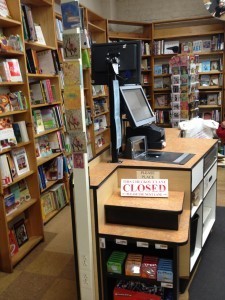Midge Raymond's Blog, page 35
September 10, 2012
Weekly Writing: On the road
Write about being pulled over. (This can be a personal story or something told from the POV of one of your characters.) Why were you pulled over? Did you try to talk your way out of a ticket? What does this experience, and your reaction to it, reveal about you?

September 5, 2012
Ask Midge: How do you know when a story is finished?

Q: How do you know when a story, or even a novel, is truly finished?
A: This is, of course, among the most challenging questions to answer because writing (and being finished with a piece) is such a uniquely personal thing. I was talking with an artist friend recently about this: She said that it must be difficult to be a writer because you actually have to finish a story or book, whereas she can always go back and rework a painting. I pointed out that writers, too, rework things a zillion times — and that even once something is “finished,” i.e., published, we often still feel as though we’d like to rewrite it. (At least, I do…and I’m sure I’m not the only one! I talked a little about this in a recent interview with Brenda Miller, c0-author (with Holly Hughes) of The Pen and the Bell: Mindful Writing in a Busy World.)
In short, whatever type of artist we may be, we probably all feel that we’re never quite done. Yet eventually paintings get sold, and stories and poems and novels get published — at that point, we have to let go. But how do we know we’re ready to send the work out into the world in the first place?
Here are a few tips (and while I use the word “story” below, the tips, of course, apply to anything from poems to essays to novels):
First, ask yourself a few important questions: Does this story reveal what I planned to say? Are the characters well developed and portrayed? Do I offer a sense of setting and detail that not only enhance but complete the piece? Does it have a beginning, middle, and end?
Next, give the project some space. You’ll need to step back and come back to your story fresh in order to see what it really needs, if anything; when we’ve been working hard on a piece, it’s impossible to get the necessary distance to know whether it’s working or not. Try a week or two; see if you’re able to look at it objectively and determine what needs fine-tuning or even complete reworking. If that’s not enough time, let it sit for a month or more. This is one step that is important not to rush.
Find a trusted reader. Most writers aren’t able to see their own work completely objectively — while we may be able to take it far, we all need at least one (or several) outside opinions to make sure we’re on the right track. Find one or two trusted people to read and respond to your story, answering the following questions: What have you gained/learned from reading this? What are your favorite parts of it? What, if anything, isn’t working for you? What do you feel is the point of this piece? Would you recommend it to others? Basically, you want to discover whether the reader has figured out what you’d hoped to say with your piece — as well as enjoyed the journey.
Send it out and gauge reactions. Once you feel it’s ready to go, send it out into the world! If you’ve finished your novel, send queries to a few agents; if you’ve finished a short story, send it to a few literary magazine editors. You’ll either get personal, detailed responses, or you may get form rejections that don’t tell you much. Keep in mind that a pile of form rejections can mean a lot of things: It can mean that your piece simply wasn’t the right fit for these particular agents or editors, or it could mean that it still needs some work. If the form rejections continue to pile up without any positive feedback at all, move on to the next step, which is…
Return to the beginning. Re-read the piece again after even more time and space and see what it might need. Be as objective if you can (and, if you have gotten some feedback, see whether it resonates with you and whether you might want to incorporate these suggestions). Then, after you’ve done another appraisal of the piece, find another reader to give you an objective opinion.
Clearly you could repeat this cycle endlessly, and no one wants to do that. At some point you will have to decide on one of the following:
1) The story is finished, and it’s publishable, and you’ll keep sending it out until it finds a home.
2) The story is finished, and it’s not publishable, and you’ll let it rest in peace.
3) The story is finished, it’s not publishable as is, and you’ll take it apart, recycle was is salvageable, and begin again.
In the end — and most important — you must ask yourself this key question: Am I proud of this? The one (and only) reader you must satisfy unconditionally is yourself. Not everyone will like what you write, but if you love it, then that’s something you can live with…and it’s the only opinion that counts.

September 3, 2012
Weekly Writing: Labor Day
For me, Labor Day has always been a day of some sort of writing-related labor, whether it’s finishing a freelance project or finally having a day to fit in some of my own writing. I always look forward to these one-day holidays, when most businesses are closed, email is quiet, and I get to tackle long-abandoned projects.
Write about Labor Day 2012. How are you spending the day? Is this a day off for you, or a day of labor? And is this the way you chose to spend your day, or are you subject to others’ plans? Let this exercise begin with Labor Day and drift into such other realms as free time, holidays, and friends and family.

August 29, 2012
Bookstore Geek: Northshire Bookstore
Northshire Bookstore in Manchester Center, Vermont, is a place for which you’ll want to set aside an entire day.
The bookstore is in a beautiful old Victorian, with several levels, including a full-service cafe on the top level and a large reading area for its many visiting authors.
It’s an fabulous place to wander through — even better, to get lost in — and among its treasures are not only books but clothing, jewelry, accessories, and a huge children’s section that includes toys and games.
Another interesting aspect of Northshire is that it’s one of the growing number of bookstores with an Espresso Book Machine, which means that you can order up any book available through the print-on-demand service (such as self-published books, small press titles, or large publishers’ backlist titles) and have it printed while you wait. And for all you indie authors out there, Northshire also has its own imprint, Shires Press, which offers a variety of packages for authors who want to self-publish their books — a very smart idea and likely one of the many reasons this bookstore is celebrating its 35th birthday and going strong.

August 27, 2012
Weekly Writing: Animals
Write about your favorite animal (as if you could pick just one!). This could be an entire species, or a specific individual. Include why and how this animal became your favorite.

August 20, 2012
Weekly Writing: Shaking things up
I once read, a long time ago, that something as simple as wearing your watch on the other wrist can lead to heightened awareness and creativity. In other words, it’s good for your brain to shake things up a little. (To this day, I’ll switch my watch to the other wrist if I need to remember something important — it really works.)
So with this in mind, my writing prompt for the week requires some action on your part: Do something different this week. Wear your watch on the other wrist. Get up on the other side of the bed. Part your hair on the other side. Then, write about the experience: Did you notice the difference, or did it have little to no effect? If you noticed any changes at all — whether in your perception, actions, creativity — what were they? And if nothing changed, why do you think that’s the case? (What I experimented with last week was parting my hair on the “wrong” side, and it definitely felt different, if for no other reason than my hair fell into the other eye for a change — but this did have the effect of heightening my awareness of the little things around me.)

August 16, 2012
Bookstore Geek: The Kiva
What’s not to love about a place where you can buy wine and books all at once? I recently discovered The Kiva in Eugene, Oregon — first drawn in by its sign, which reads “Grocers, Booksellers, Wine Merchants.”
What’s fun about The Kiva is just what the sign indicates: that you can get your grocery and wine shopping done as well as browse for books, gifts, and cards. The grocery prides itself on stocking local and fair-trade foods and beverages, and they have a lot of wonderful wine and beer options, from reasonably priced malbecs to a variety of local microbrews.
I’m not sure what was more fun — to see groceries in a bookstore, or to see books in a grocery store.
The Kiva website highlights everything except the books (books actually comprise a small portion of the store), but the site has a blog that pays a bit more attention to the literary aspect of the place; many of the blog posts focus on books, from summer reading to the books about food, like Forks Over Knives. The bookshelves are stocked primarily with cookbooks, children’s books, and nonfiction — and it’s a fun place to browse. I’d highly recommend stopping in the next time you’re in downtown Eugene, whether you’re there to pick up wine with your books, or books with your wine.

August 13, 2012
Weekly Writing: Crime
Write about a crime you read or heard about that has always stuck with you. Explore why you’ve remembered it and how it has affected your outlook on the world.

August 9, 2012
Shaking up old writing routines
I am not a morning person and never have been. And never in a million years did I think I would enjoy writing at sunrise (let alone before sunrise, which will be happening this fall when the time changes). Granted, I’ve been getting up early to write off and on over the years — in part because the cat wakes me up for food (he is relentless about this) and I figure I may as well be up writing than lying there trying to sleep while he throws his twelve furry pounds against the bedroom door — and in part because it’s often the only time I have to write. But this schedule has never stuck for long; when given the choice, I’ll sleep in every time (and then, of course, I’ll be grouchy about not having written).
But for the last few weeks, I’ve actually been enjoying my early morning writing — far more than I ever imagined I could. It may be because I’ve had a breakthrough on a project I’m working on. It may be because I’ve set new rules for myself about when I can be online (which is not often anymore, and not at all during my Writing Time), and this frees up so much mental energy. Or it may be because I’m adopting a practice that Hemingway followed when he wrote: stopping when there’s still more to say, not after you’ve gotten everything in you on the page.
And I think this new practice has done wonders. My habit has always been write down everything that’s in my brain — the worry being that I’d forget it all if I didn’t get it down as soon as possible. But there’s something to this notion of leaving a little left for the next writing session. As Hemingway advised: “You write until you come to a place where you still have your juice and know what will happen next and you stop and try to live through until the next day when you hit it again.” And this is probably why I find myself eagerly getting to work in the morning instead of dragging myself to it.
All this — and sunrises.
For those of you who’ve never tried this, I encourage you to go for it: Leave something for the next day. You just may find that it’s just what you need to make an old writing routine new again.

August 6, 2012
Weekly Writing: Clocks
Write about a clock — anything from a family heirloom to a clock that you watch at the office. Expand on this to include your thoughts and emotions regarding time and how you feel about it in the context of your life. Do you feel you have too little time, too much, or a good balance?














